Natural Home Remedies for Food Poisoning
By Dr Ashok Pal +2 more

Get,

to manage your symptom
Get your,


4 Cr+ families
benefitted

OTP sent to 9988776655



You’ve successfully subscribed to receive
doctor-approved tips on
Whatsapp

Get ready to feel your best.

Hi There,
Download the PharmEasy App now!!


Register to Avail the Offer
Send OTPBy continuing, you agree with our Privacy Policy and Terms and Conditions

Hi There,
Sign up on PharmEasy now!!
Trusted by 4 crore+ families

OTP sent to 9988776655



You have unlocked 25% off on medicines




Code: NU25
By Dr Ashok Pal +2 more
Table of Contents
Food poisoning, also called foodborne illness, occurs when we consume food that has been contaminated by microbes. These microorganisms can contaminate the food during any part of their processing journey till it reaches us and causes illness. Food poisoning is not necessarily caused by outside food, it can also occur when food is incorrectly handled or cooked at home. The symptoms of food poisoning can begin within a few hours of eating contaminated food. It may resolve without any treatment as well in mild cases, which is often the case, but sometimes in severe cases, a person might require hospital admission too4.
Most often, food poisoning is seen in a large group of people who have all consumed the same contaminated food. It can also occur in individuals. Food poisoning is mainly the result of contamination of food, which can occur due to :

Some of the most commonly experienced symptoms by people suffering from food poisoning are2, 5:
The symptoms of food poisoning can range from mild to very serious, depending on the type of microorganisms we get infected by and each body’s individual defense system2. A few home remedies for food poisoning are as follows:

As vomiting is one of the common symptoms experienced, rehydration becomes very important2. Oral rehydration solution (ORS) can also be prepared at home by adding sugar and salt to a bottle of clean drinking water as per WHO guidelines. This homemade electrolyte-rich solution should be sipped every few minutes and should be used up within a day. Adding a pinch of cinnamon to coconut water and consuming it is also helpful for vomiting.

Lemon juice can be consumed by people when they experience food poisoning. It can be consumed by taking one glass of drinking water and squeezing half a lemon into it. It is a refreshing liquid and seems to make one feel better after consuming it.
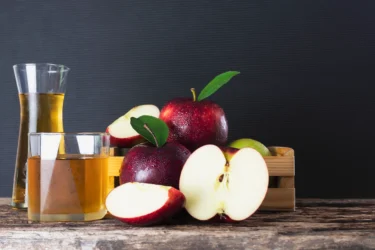
Apple cider vinegar is another popular home remedy being used for food poisoning. Add a few spoons of apple cider vinegar to a glass of water and consume two to three times a day to reap its benefits.

This is one of the more uncommon remedies used, but it is quite effective. Oregano oil or thyme oil, one of these two oils can be used. These oils seem to provide relief from the discomfort caused by food poisoning. To use it, we must add a few drops of the oil to water and consume it one to two times a day. How or why this works is not very clear.
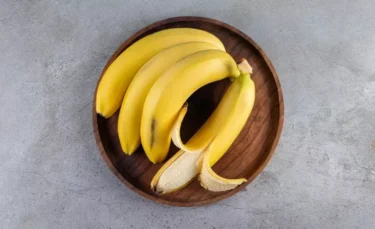
Bananas are extremely helpful in restoring lost electrolytes during diarrhoea. Therefore, it is used to treat food poisoning as well. Some people consume a banana by mixing it with curd, for better effects, but it can be consumed directly as well. It provides relief from symptoms, energises us, and replenishes lost salts.
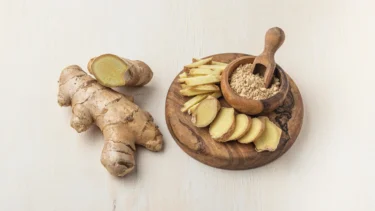
Ginger (adrak) has been used in ayurveda for centuries to relieve vomiting, loss of appetite, and diarrhoea. A basin is made using amlaki and black gram around the navel. To this, the juice of fresh ginger is added once daily and retained for some time, to treat diarrhoea. As a cure for vomiting, ginger juice must be mixed with lemon juice and consumed fresh3. We can mix ginger (juice) in warm water and add honey to it as well. These home remedies are not just safe and natural, but also very tasty.
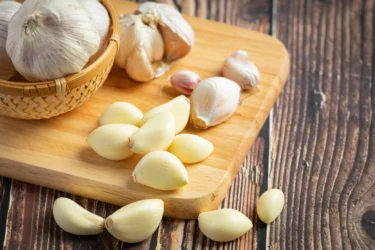
Swallowing fresh cloves of garlic with water is said to have beneficial effects on our bodies, as garlic acts like a cleansing agent. If consumed in a juice form, garlic is said to be even more effective, that is, if the pungent odour can be tolerated by you! It is said to be effective in the case of food poisoning.
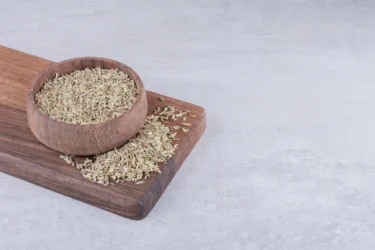
To use jeera as a remedy for food poisoning, we can take a little bit of jeera in water and boil it. After it boils, we can add a little coriander juice and salt to taste. This liquid preparation can be consumed a few times a day safely.
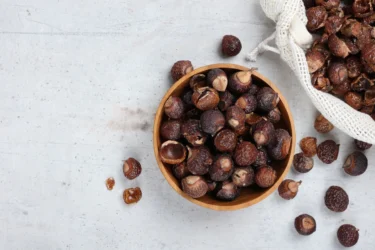
It is also known as Risht (in Hindi) or Indian soapnut, and it is used in ayurveda as a remedy for food poisoning. To use it, we need to soak a few of these aristhtaka seeds in a bottle of water and consume the water. This is said to reduce the poisoning3.
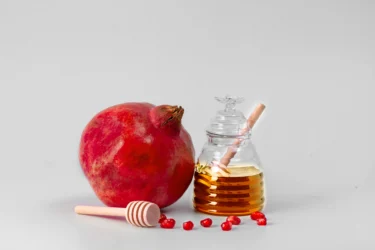
The following remedies are also recommended for use for diarrhoea in Ayurveda:
Also Read: Everything You Need to Know About the Hepatitis A Vaccine
It is wise to visit your doctor or a local healthcare provider if the following symptoms are noticed:
Also Read: Causes Behind Recurring Stomach Pain
Food poisoning is a common condition occurring as a result of eating food that has been contaminated by microorganisms; it can certainly be the source of a lot of discomfort. It can be quite unsettling with symptoms of nausea, vomiting, diarrhoea, and fever. It drains the body of vital water and minerals. Therefore, home remedies for food poisoning mainly consist of replenishing our body and relieving the distress. Rest and proper nutrition are what will help you regain your strength and eliminate the disease-causing germs.
Also Read: Natural Home Remedies for Open Pores
Food poisoning can cause dehydration, which may cause dizziness. Make sure to increase your water intake and consume oral rehydration syrup (ORS) if you feel dizzy.
Food poisoning mainly affects the stomach and causes diarrhoea, vomiting, etc2. It is not reported to have any effects on the kidney.
Puffed rice/popped rice, locally called poha, can be soaked in water. It is known to be effective in relieving vomiting.
There is no evidence stating that loss of hair is caused due to food poisoning. More evidence in the form of research is required to correlate the two.
1. MADDOCK EC. Food poisoning. Pharm J [Internet]. 1947;104(4344):87. Available from: https://medlineplus.gov/ency/article/001652.htm
2. Food Posisoning Symptoms [Internet]. CDC.gov. 2022 [cited 6 May 2022]. Available from: https://www.cdc.gov/foodsafety/symptoms.html
3. AYUSH. Ayurveda Offering Herbal Healing [Internet]. 1–128 p. Available from: https://www.esic.nic.in/attachments/publicationfile/7d11b02e5abb4717d53b4ce05efabd21.pdf
4. National Institute of Diabetes and Digestive and Kidney Diseases. Definition & facts of food poisoning. National Institute of Diabetes and Digestive and Kidney Diseases. 2025 [cited 2025 May 14]. Available from: https://www.niddk.nih.gov/health-information/digestive-diseases/food-poisoning/definition-facts
5. Department of Health & Human Services. Food poisoning – prevention. Better Health Channel. [cited 2025 May 14]. Available from: https://www.betterhealth.vic.gov.au/health/healthyliving/food-poisoning-prevention
Disclaimer: The information provided here is for educational/awareness purposes only and is not intended to be a substitute for medical treatment by a healthcare professional and should not be relied upon to diagnose or treat any medical condition. The reader should consult a registered medical practitioner to determine the appropriateness of the information and before consuming any medication. PharmEasy does not provide any guarantee or warranty (express or implied) regarding the accuracy, adequacy, completeness, legality, reliability or usefulness of the information; and disclaims any liability arising thereof
Comments

Leave your comment...
You may also like
Comments